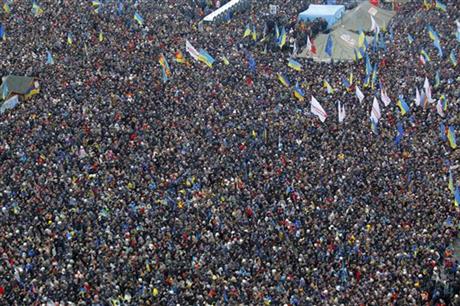
By JIM HEINTZ
Pro-European Union activists gather during a rally in Independence Square in Kiev, Ukraine, Sunday, Dec. 15, 2013. About 200,000 anti-government demonstrators converged on the central square of Ukraine’s capital Sunday, a dramatic demonstration that the opposition’s morale remains strong after nearly four weeks of daily protests. (AP Photo/Sergei Grits)
Ukraine Protests
Ukrainians listen to a speaker standing in front of a large cross in memory of the victims in the 1920-1930s during the Stalin regime during a Pro-European Union rally at the Independence Square in Kiev, Ukraine, Sunday, Dec. 15, 2013. About 200,000 anti-government demonstrators converged on the central square of Ukraine’s capital Sunday, a dramatic demonstration that the opposition’s morale remains strong after nearly four weeks of daily protests. (AP Photo/Alexander Zemlianichenko)
Ukraine Protests
Supporters of Yanukovych’s party of Regions wave their flags during a rally in Kiev, Ukraine, Sunday, Dec. 15, 2013. A much smaller rally of government supporters, about 15,000, was taking place about a kilometer away from Independence Square familiarly called Maidan, where anti-government protesters have set up an extensive tent camp and erected barricades of snow hardened with freezing water and studded with scrap wood and other junk. (AP Photo/Sergei Grits)
Prev 1 of 3 Next
KIEV, Ukraine (AP) — Ukraine’s opposition appears confident and shows no sign of relenting in its standoff with the government. The government has made some gestures toward the opposition, rejected some of its main demands and is opaque on another. In the fourth week of the crisis, a look at each side’s strengths and weaknesses as the dispute extends into the depths of winter.
SOFT POWER
The opposition’s unquestionable strong suit is the remarkably high morale of crowds at round-the-clock protests in frigid weather — throngs swelling to hundreds of thousands on weekends. Their extemporaneous but intricate organization keeps protesters fed, provides places to sleep in tents or protester-occupied buildings and keeps them entertained with a seemingly endless rotation of high-quality bands.
The unflagging enthusiasm reflects how protests that started with a somewhat stolid policy issue — signing of a trade and political agreement with the European Union — have expanded into an existential quest, a desire to make plain how the Ukrainian people see themselves and want to be. More than one commentator has said the volunteer work at the protest camp, and especially the demonstrators’ firm but non-violent resistance to police, show a cohesion that effectively witnesses the “birth of a nation.”
The pro-government side appears dully obedient at best. A Sunday rally by government supporters that was touted as potentially bringing 200,000 to Kiev drew less than a tenth of that number, and some of the demonstrators admitted they’d been paid to come.
HARD POWER
The government has a huge corps of feared riot police — 10,000 of them, the opposition claims. In addition, the military could be called in to break up protests, a prospect that U.S. Defense Secretary Chuck Hagel warned Ukraine against considering. While the government has the overwhelming power, its willingness to use it is in doubt. Two violent police assaults on demonstrators only galvanized the protests. Squadrons of riot police twice confronted demonstrators in Kiev over the past week, then withdrew, leading to speculation that some units were wavering in their loyalty to the government.
POWER OF MONEY
The issue that ignited the protests was President Viktor Yanukovych’s shelving of an “association agreement” with the EU and a turn toward closer ties with Russia. Moscow has put heavy pressure on Ukraine to join a Russia-led customs union. Yanukovych and Russian President Vladimir Putin are to meet on Tuesday, and speculation is strong that Yanukovych will give in to Russian financial incentives and sign on, a move that opposition leaders warn would only make the protests grow.
Yanukovych and other Ukrainian officials have said the country hasn’t abandoned its European aspirations, but that it couldn’t afford the potential lost trade with Russia. Talks with the EU resumed last week.
The bloc’s enlargement commissioner, Stefan Fuele, promised that additional aid could come if Ukraine signs. Deputy Prime Minister Serhiy Arbuzov said Ukraine was ready as soon as certain issues, presumably financial, were worked out. But Fuele said on Twitter on Sunday that the talks were on hold because Ukraine’s words and actions were “further and further apart.”
Ukraine’s tycoons could play a key role with political influence. Rinat Akhmetov, regarded as Ukraine’s richest man, on Friday expressed frustration with the uncertainty about Ukraine’s EU intentions and boosted the protesters’ image by saying “the fact that peaceful people took to the streets for peaceful demonstrations shows Ukraine is a free democratic country.”
FIGHT THE POWER
Although the protests started as a demand to sign the EU agreement, their ambition has expanded to dismissing the government and holding early elections for president and parliament.
That’s a non-starter for Yanukovych, who last week pointedly reminded the opposition that their attempt to push through a no-confidence vote in parliament this month failed.



